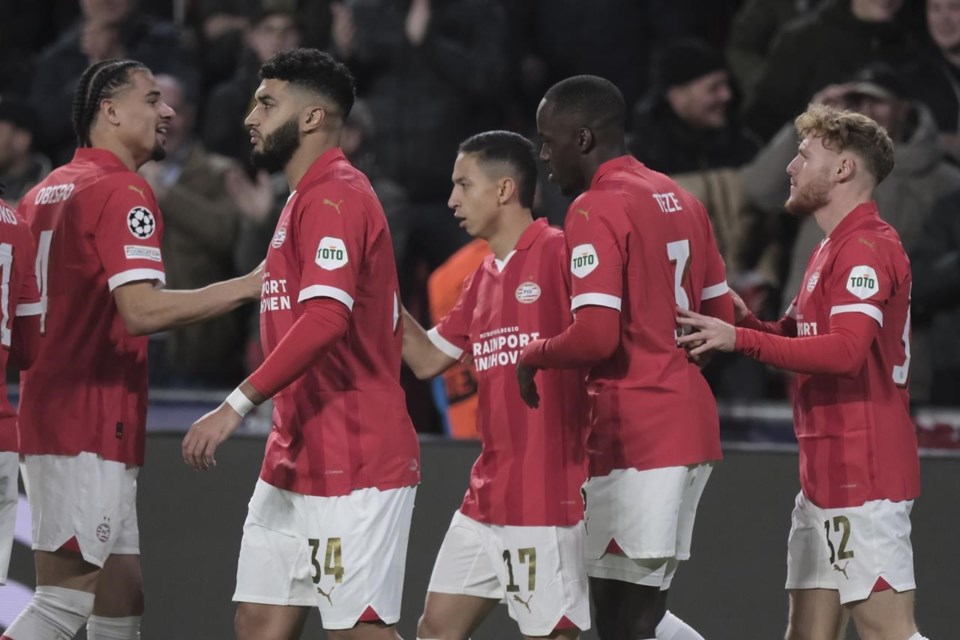So much for the English taking over European soccer.
The final Champions League group stage in its current format ended with representation from the supposedly all-powerful Premier League cut in half as Manchester United and Newcastle failed to advance to the knockout stage — and were even knocked out of European competition altogether.
Instead, there was a Spanish resurgence, a decent showing from the German contingent, and a couple of nice surprises making their way into the round of 16 in the form of Copenhagen and PSV Eindhoven.
This was the last year of the 32-team, eight-pool group stage, with UEFA pivoting next season to a single 36-team league that will see clubs play eight games — up from the current six. The top eight teams will advance automatically to the round of 16 knockout bracket and Nos. 9 to 24 in the standings go into a playoff round to decide the other eight qualifiers.
So, what have we learned ahead of the round of 16 draw on Monday?
ENGLAND'S STRUGGLES
There will be wry smiles around Europe as English teams received a bloody nose, just when the Premier League seemed to have unstoppable momentum on the back of wealth generated from huge broadcast deals. Only defending champion Manchester City and Arsenal got through, marking England's weakest round-of-16 challenge in 11 years. It's quite the slump for a country that has provided six of the last 10 finalists and three of the last five winners. Not helping England's cause was this being Newcastle's first participation in 20 years, with the Saudi-owned northeast team plunged into the toughest group — containing Borussia Dortmund, Paris Saint-Germain and AC Milan — and running into an injury crisis that hit a relatively shallow squad. Oh, and there was a huge refereeing error that ultimately cost Newcastle dear. As for United, it was a chaotic campaign for a club in something of a maelstrom amid ownership wrangles and concerns over the quality of its manager.
SPAIN’S SURGE
Of the eight group winners — Bayern Munich, Arsenal, Real Madrid, Real Sociedad, Atletico Madrid, Dortmund, Man City and Barcelona — four are from Spain. While it was expected from Madrid, and potentially Barca and Atletico, too, given they were placed in weak groups, Sociedad's rise with a mostly homegrown team and coach is a welcome sight for romantics keen to see new names thrive. In its first Champions League season in a decade, Sociedad was unbeaten and conceded just two goals. Barca is back in the big time, too, after a failing to get out of the group stage in its first two post-Lionel Messi seasons. Real, fueled by Jude Bellingham, was one of two teams — with Man City — to claim a maximum of 18 points while Atletico was unbeaten, too. Germany arguably performed the best of the rest, with Bayern and Dortmund winning groups and Leipzig second behind City.
SURPRISE PACKAGES
PSV, the European champion in 1988 and runaway leader in the Eredivisie, is in the knockout stage for the first time since 2016. Its only loss in 26 games this season was a 4-0 beating by Arsenal in their Champions League opener. Copenhagen's only previous appearance in the round of 16 was in 2011. The Danish champion helped dump out Man United and has been boosted by playing in front of a passionate home crowd at the atmospheric Parken Stadium. Having said that, the two clubs whose budgets are counted in tens of millions not hundreds are opponents that group winners likely will want to face next. The other runners-up were Napoli, Inter Milan, Lazio, PSG, Leipzig and Porto.
MIND THE GAP
Adapting to the demands of the Champions League is difficult even for teams from well-financed top leagues. Newcastle and Lens returned after decades away and Union Berlin made its tournament debut. They combined to win three of 18 games and only Lens will still play European games in February, in the second-tier Europa League. The extra intensity of a two-games-per-week schedule of Champions League and domestic games also makes it tough to sustain last season's results. Newcastle and Lens are in seventh place and Union is 15th. Compare their fortunes with domestic league leaders Liverpool, Bayer Leverkusen and Girona — all free of Champions League commitments. So is Juventus — second to Inter in Serie A while serving a one-year UEFA ban for financial wrongdoing — and PSG's closest rivals in France, Nice and Monaco. Sitting out the Champions League can help build the title challenge to get back into it.
SUPER LEAGUE
After big-ticket games on the field, now the lawyers take over. A final ruling in the Super League case is scheduled next Wednesday from judges at the Court of Justice of the European Union in Luxembourg. It is two years, eight months since 12 storied clubs from Spain, Italy and England tried to launch a breakaway league they would run outside of UEFA's authority and that would effectively kill the Champions League. The project failed within 48 hours but the clubs' legal case started in a friendly Madrid court goes on. Just Real Madrid and Barcelona are still actively attached to the case after Juventus withdrew six months ago. One year ago, a non-binding opinion from the court favored UEFA. A win for the clubs next week would be a shock, but the judges are looking at other sports cases in relation to competition law. A total win for UEFA likely also should not be expected.
___
AP soccer: https://apnews.com/hub/soccer
Steve Douglas And Graham Dunbar, The Associated Press



